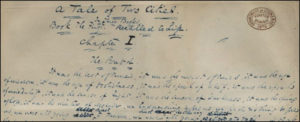
At the risk of alienating those who deny the existence of God or those who just have serious doubts about the existence of a being who created all of this, I’m nonetheless doing this piece about spirituality. I respect those who don’t agree with my views on religion. I’d better, considering my own set of beliefs probably place me heavily in the minority on such matters. I would like to think we can agree there’s more to this animate existence than its gross physical nature, but to those who would accuse me of magical thinking, I plead guilty and hope there is common ground on how the arts can elevate us to more profound states of mind and emotional euphoria.
Participating in the arts by passive or active roles can give us great pleasure, insights and inspiration. When I have to do a task that I have not surrendered to or appreciated for its intrinsic value in the moment, such as washing dishes, I like to put on some lively music that might energize me. When I’m feeling anxious or unpleasant in any emotional way, I’m inclined to watch a good comedy that can make me laugh out loud. Even if you are a cynical sort, you should be able to recognize that these art forms are capable of bringing about a transformation of mental energy from negative to positive. They lift your spirits, one might say.
So, one being entertained by the arts can take part in them by simply experiencing them. There’s nothing wrong with that. I would be shocked if there’s a musician or writer or any kind of artiste that doesn’t enjoy the aesthetic work of others from time to time. Even the most unkind critics admit to being deeply affected occasionally by the creations of those for whom they dip their poison pens. The portal to which I refer in this blog headline is available to all lovers of artistic work. I do believe, however, the greatest potential for a spiritual connection comes to those who actively practice their chosen labor of love.

One of the most obvious connections is found in the world of music where singers chant their way to a blissful state. I have attended Self Realization Fellowship services where a song is chanted repeatedly to bring about a sense of union with God. Peace and love are easily generated with these chants, and as Elvis Costello sang, “What’s so funny about peace, love and understanding?” The mantra is related to this use of sound to open the portal, so to speak. Encyclopaedia Britannica’s website entry on Buddhist and Hindu mantra describes it succinctly. “In Hinduism and Buddhism, a sacred utterance (syllable, word, or verse) that is considered to possess mystical or spiritual efficacy. Various mantras are either spoken aloud or merely sounded internally in one’s thoughts, and they are either repeated continuously for some time or just sounded once. Most mantras are without any apparent verbal meaning, but they are thought to have a profound underlying significance and are in effect distillations of spiritual wisdom. Thus, repetition of or meditation on a particular mantra can induce a trancelike state in the participant and can lead him to a higher level of spiritual awareness.”
The point of these activities is to at least bring us to the here and now. This is where the portal can be found. One of my favorite quotes on this subject is from Eckhart Tolle’s Practicing the Power of Now. “When you surrender to what is and so become fully present, the past ceases to have any power. The realm of Being, which had been obscured by the mind, then opens up. Suddenly, a great stillness arises within you., an unfathomable sense of peace. And within that peace, there is great joy. And within that joy, there is love. And at the innermost core, there is the sacred, the immeasurable, That which cannot be named.”
Our creative works, arising from that innermost core, have the potential of bringing you to a connection with all of which you are a part, transcending the coarse and shallow level of existence to which we have become accustomed. There’s nothing magical about this. When you’re fully involved in the creative process, bringing something into existence from nothing, tapping into an energy source you don’t even understand, you’re reaching through the portal. I choose to believe that is the Divine. Whatever you choose to believe is up to you, but it’s truly special…beautiful…brilliant…full of love…accessible. May we use our gift of the arts to its fullest.



